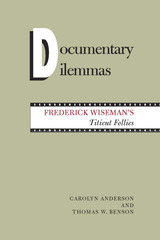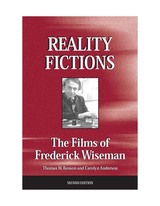
A case history of the only American film under court-imposed restrictions for reasons other than obscenity or national security.
Titicut Follies is an excoriating depiction of conditions in the Massachusetts Correctional Institution at Bridgewater, a prison-hospital for the criminally insane. The Commonwealth of Massachusetts took Wiseman to court, seeking to prevent the exhibition of Titicut Follies soon after its release in 1967.
This account of the Titicut Follies case is based on ten years of research and relies on interviews, journalistic accounts, and especially on the legal record, including the Commonwealth v. Wiseman transcript, to describe the entire process of independent documentary filmmaking. The trials of Titicut Follies raise crucial questions about the relation of social documentary to its subjects and audiences.

Providing in-depth accounts and close critical examinations of nine of Wiseman’s films—Titicut Follies, High School, Basic Training, Essene, Juvenile Court, Primate, Welfare, Canal Zone, and The Store—thissecond edition features a new introduction, a revised and updated filmography, and an updated bibliography.
No book on documentary film has ever analyzed in such detail the work of a single filmmaker. In impeccable close readings of his films, Tom Benson and Carolyn Anderson explore how Frederick Wiseman has elaborated his widely admired sensibility.
A special feature is an extended chapter on the legal difficulties encountered by Wiseman’s first documentary, Titicut Follies, an unflinching depiction of conditions in the Massachusetts Correctional Institution at Bridgewater. The Commonwealth of Massachusetts took Wiseman to court, seeking to prevent the exhibition of Titicut Follies. In New York State, three judges refused to issue an injunction against the film. In Massachusetts, the film was the subject of a sensational series of legislative hearings and a court trial, in which the principals gave very different stories of the conditions and terms under which the film had been negotiated and produced.
Wiseman, himself an attorney, exchanged charges and countercharges with Massachusetts Attorney General Elliot Richardson, and the controversy split the civil liberties community. Judge Harry Kalus, calling Titicut Follies "a nightmare of ghoulish obscenities," not only ruled for the Commonwealth but ordered that the film be destroyed. On appeal, the Massachusetts Supreme Judicial Court modified the Kalus ruling, allowing the film to be seen only by professional audiences. Titicut Follies became the only American film whose exhibition is restricted for reasons other than obscenity or national security.
After Titicut Follies, Wiseman went on to become a major independent documentary producer. Many of his films have been shown on public television in the United States and at film festivals around the world. The films are widely admired and often highly controversial. Wiseman has developed a unique cinematic rhetoric that draws from both the documentary and fiction traditions to describe American institutions: a high school, basic training, a monastery, a juvenile court, a primate research center, a welfare agency, the Panama canal zone, and a department store. Benson and Anderson scrutinize each of these films, record the reactions of some of his subjects and audiences, and present the heretofore neglected contributions of his four cinematographers: John Marshall, Richard Leiterman, William Brayne, and John Davey.
READERS
Browse our collection.
PUBLISHERS
See BiblioVault's publisher services.
STUDENT SERVICES
Files for college accessibility offices.
UChicago Accessibility Resources
home | accessibility | search | about | contact us
BiblioVault ® 2001 - 2024
The University of Chicago Press









